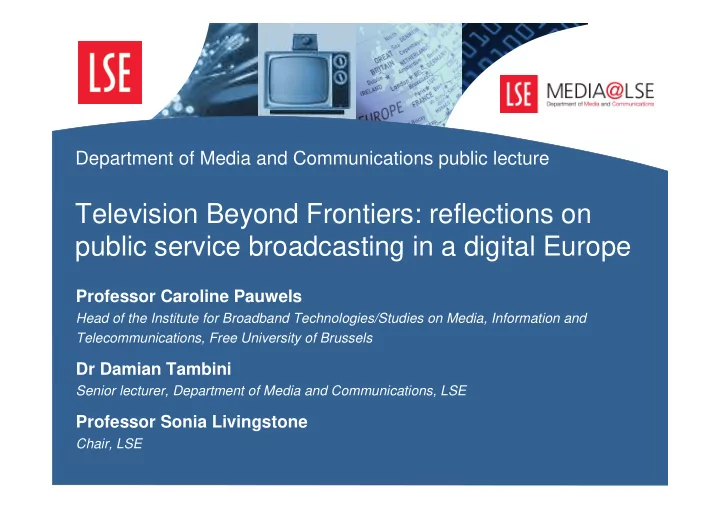

Department of Media and Communications public lecture Television Beyond Frontiers: reflections on public service broadcasting in a digital Europe Professor Caroline Pauwels Head of the Institute for Broadband Technologies/Studies on Media, Information and Telecommunications, Free University of Brussels Dr Damian Tambini Senior lecturer, Department of Media and Communications, LSE Professor Sonia Livingstone Chair, LSE
FROM TELEVISION WITHIN FRONTIERS TO TELEVISION BEYOND FRONTIERS: Reflections on Public Service Media in a digital Europe. Prof. Dr. Caroline Pauwels
OVERVIEW • Preliminary remarks • Chronological overview PSB -> PSM history 1. Television within frontiers 2. Television without frontiers 3. Television beyond frontiers • Conclusions & recommendations
1. PRELIMINARY REMARKS • PSB studies & rhetoric: television bias -> need for multi- or cross-mediality • Normative nature of debate: choice for PSM is societal choice, result of political vision on society • Avoid dichotomous thinking & false arguments: PSM indeed is a ‘usual suspect’ • PSM covers up for empirical diversity
NUMBER OF TV CHANNELS IN THE EUROPEAN UNION HAS TRIPLED Source: Based on EBU Members’ data
TV MARKET SHARE EU 27* *Bulgaria, Luxembourg, Malta and Romania not included due to missing data Source: Based on EBU Members’ data
PSM MARKET SHARES TV & RADIO
AMOUNT OF PUBLIC FUND/OVERALL BUDGET/INHABITANT
AMOUNT PUBLIC FUNDING/INHABITANT
BENCHMARK VRT FINANCING Budget per Inhabitant (€/pp) Government subsidy per Inhabitant (€/pp) Others: Average of 7 public broadcasters incl. VRT
BUDGET/INHABITANT -> VARYING RADIO & TV OFFERS
2. CHRONOLOGICAL OVERVIEW 1. Television within frontiers = managing SCARCITY 2. Television without frontiers = managing CHOICE 3. Television beyond frontiers = managing ABUNDANCE
First period TELEVISION WITHIN FRONTIERS: managing scarcity
TELEVISION WITHIN FRONTIERS = MANAGING SCARCITY • Ideas – Enlightenment, emancipation & humanism – Spectrum scarcity Interests • – Nation States – Political elites – Citizens – … – Radio industry – No real independent TV production industry • Institutions – Nation state level: national or regional – No real EU interference – Cultural and social objectives
Second period TELEVISION WITHOUT FRONTIERS: managing choice
TELEVISION WITHOUT FRONTIERS = MANAGING CHOICE • Ideas Postmodernism – Neo-liberalism – Consumer sovereignty: his majesty, the viewer – New public management – • Interests – PSB Inc. – Private sector: broadcasters, advertisers, independent production companies – Consumers – EU institutions – Upcoming WTO/Unesco battle for legitimation • Institutions – (Nation) State at a distance -> ‘independent’ regulators – Impact of EU liberalization and market integration agenda – Economic liberalization & harmonzsation agenda – Sector specific and horizontal policies: competition law on the rise – Subsidiarity: Article 151(4) EC treaty (now Article 167(4) TFEU) & Amsterdam protocol (1997) – Impact WTO (>< UNESCO)
Third period TELEVISION BEYOND FRONTIERS: managing abundance
TELEVISION BEYOND FRONTIERS = MANAGING ABUNDANCE • Ideas Late modernism; hybridization, liquid society – Open source, Social media & wisdom of the crowds – Cultural diversity movement – Googlenomics: ’free’ economy movement – Public sector management/public value management – • Interests – Multi-stakeholder media environment • Traditional media players, but no longer confined to broadcasting: publishers, distributors • New players: – You Tube, Google, – cultural institutions – PS Multimedia Entrepreneurs – UGC: prosumers or produsers • Institutions – From TWF -> Audiovisual media services directive: meeting convergence! – Full fledged competition policy: Public value tests & market impact assessment – UNESCO’s convention on cultural diversity
3. CONCLUSIONS • Implement overall legal framework conducive to global PSM environment & spirit – PSM fund: 1. Sustainable funding for PSM institution as a platform, middle long term guarantees 2. Public Service Programming fund, available to all, no top slicing of PSM funding (1) however – Implement & enhance existing Legal media framework – Competition law – Media literacy & media capabilities initiatives: secure demand for PSM offer • Reposition PSM along new core tasks – Conversation: embrace social media but be a trusted guide & counterbalance the paradox of choice – Citizen & competences/capabilities approach; address digital divides (access, capabilities, critical sense, privacy…); social search engine – Credibility – Creativity & innovation: on SW & HW level – Conservation: secure common cultural heritage & national narratives
Department of Media and Communications public lecture Television Beyond Frontiers: reflections on public service broadcasting in a digital Europe Professor Caroline Pauwels Head of the Institute for Broadband Technologies/Studies on Media, Information and Telecommunications, Free University of Brussels Dr Damian Tambini Senior lecturer, Department of Media and Communications, LSE Professor Sonia Livingstone Chair, LSE
Recommend
More recommend